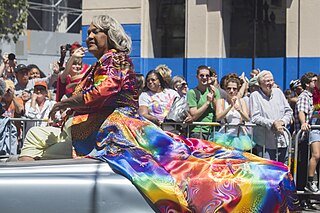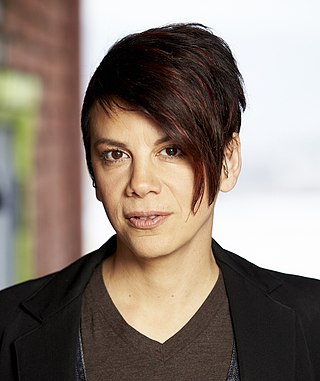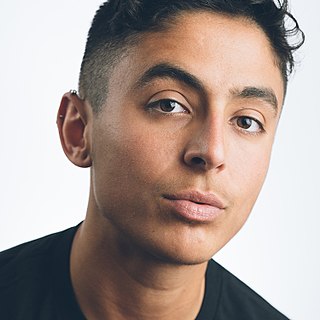
LGBT movements in the United States comprise an interwoven history of lesbian, gay, bisexual, transgender and allied social movements in the United States of America, beginning in the early 20th century. A commonly stated goal among these movements is social equality for LGBT people. Some have also focused on building LGBT communities or worked towards liberation for the broader society from biphobia, homophobia, and transphobia. LGBT movements organized today are made up of a wide range of political activism and cultural activity, including lobbying, street marches, social groups, media, art, and research. Sociologist Mary Bernstein writes: "For the lesbian and gay movement, then, cultural goals include challenging dominant constructions of masculinity and femininity, homophobia, and the primacy of the gendered heterosexual nuclear family (heteronormativity). Political goals include changing laws and policies in order to gain new rights, benefits, and protections from harm." Bernstein emphasizes that activists seek both types of goals in both the civil and political spheres.

Intersex Awareness Day is an internationally observed awareness day each October 26, designed to highlight human rights issues faced by intersex people.
Advocates for Informed Choice, dba interACT or interACT Advocates for Intersex Youth, is a 501(c)(3) nonprofit organization using innovative strategies to advocate for the legal and human rights of children with intersex traits. The organization was founded in 2006 and formally incorporated on April 12, 2010.

Hida Viloria is a Latine American writer, author, producer, and human rights activist. Viloria is intersex, nonbinary, and genderfluid, using they/them pronouns. They are known for their writing, their intersex and non-binary human rights activism, and as one of the first people to come out in national and international media as a nonbinary intersex person. Viloria is Founding Director of the Intersex Campaign for Equality.

Intersex civil society organizations have existed since at least the mid-1980s. They include peer support groups and advocacy organizations active on health and medical issues, human rights, legal recognition, and peer and family support. Some groups, including the earliest, were open to people with specific intersex traits, while others are open to people with many different kinds of intersex traits.

The International Intersex Forum is an annual event organised, then later supported, by the ILGA and ILGA-Europe that and organisations from multiple regions of the world, and it is believed to be the first and only such intersex event.

Mauro Cabral Grinspan, also known as Mauro Cabral, is an Argentinian intersex and trans activist, who serves as the Senior Officer for Gender Justice and Equity at the Global Philanthropy Project. Before that, he was the Executive Director of GATE. His work - as a signatory of the Yogyakarta Principles - focuses on the reform of medical protocols and law reform. In July 2015, Cabral received the inaugural Bob Hepple Equality Award.
Georgiann Davis is an associate professor of sociology at the University of New Mexico and author of the book Contesting Intersex: The Dubious Diagnosis. Davis formerly held similar positions at University of Nevada, Las Vegas and Southern Illinois University Edwardsville. Born with Androgen Insensitivity Syndrome, she writes widely on intersex issues and the sociology of diagnosis.

Intersex, in humans and other animals, describes variations in sex characteristics including chromosomes, gonads, sex hormones, or genitals that, according to the UN Office of the High Commissioner for Human Rights, "do not fit typical binary notions of male or female bodies".
Natasha Jiménez is a trans and intersex activist and author who is currently the General Coordinator for MULABI, Latin American Space for Sexualities and Rights, the first host of the Intersex Secretariat for ILGA. She is an advisory board member for the first intersex human rights fund and participated in the first intersex hearing on human rights before the Inter-American Commission on Human Rights.
Ruth Baldacchino is an LGBT and intersex activist, former Co-Secretary General of the International Lesbian, Gay, Bisexual, Trans and Intersex Association, and Senior Program Officer for the first intersex human rights fund.

Pidgeon Pagonis is an American intersex activist, writer, artist, and consultant. They are an advocate for intersex human rights and against nonconsensual intersex medical interventions.

Intersex people are born with sex characteristics that "do not fit the typical definitions for male or female bodies". They are substantially more likely to identify as lesbian, gay, bisexual, or transgender (LGBT) than endosex people, an estimated 52% identifying as non-heterosexual and 8.5% to 20% experiencing gender dysphoria. Although many intersex people are heterosexual and cisgender, this overlap and "shared experiences of harm arising from dominant societal sex and gender norms" has led to intersex people often being included under the LGBT umbrella, with the acronym sometimes expanded to LGBTI. Some intersex activists and organisations have criticised this inclusion as distracting from intersex-specific issues such as involuntary medical interventions.

Intersex people in the United States have some of the same rights as other people, but with significant gaps, particularly in protection from non-consensual cosmetic medical interventions and violence, and protection from discrimination. Actions by intersex civil society organizations aim to eliminate harmful practices, promote social acceptance, and equality. In recent years, intersex activists have also secured some forms of legal recognition. Since April 11, 2022 US Passports give the sex/gender options of male, female and X by self determination.

The Malta declaration is the statement of the Third International Intersex Forum, which took place in Valletta, Malta, in 2013. The event was supported by the ILGA and ILGA-Europe and brought together 34 people representing 30 organisations from multiple regions of the world.

In Mexico there are no explicit rights reserved to intersex persons, no protections from non-consensual cosmetic medical interventions on intersex children and no legislative protection from discrimination. Intersex persons may have difficulties in obtaining necessary health care.

Intersex people are born with natural variations in physical and sex characteristics including those of the chromosomes, gonads, sex hormones, or genitals that, according to the UN Office of the High Commissioner for Human Rights, "do not fit the typical definitions for male or female bodies". Such variations may involve genital ambiguity, and combinations of chromosomal genotype and sexual phenotype other than XY-male and XX-female. Preimplantation genetic diagnosis allows the elimination of embryos and fetuses with intersex traits and thus has an impact on discrimination against intersex people.
Kimberly Zieselman is an attorney, human rights advocate, author, and intersex woman, with androgen insensitivity syndrome. She currently serves as executive director of interACT, and is a signatory of the Yogyakarta Principles plus 10. In 2020, her memoir XOXY was published.







